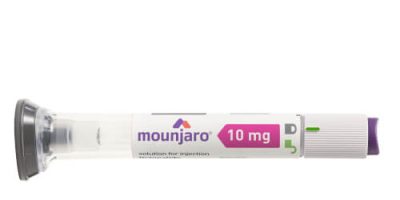Mounjaro (Tirzepatide)
Mounjaro is a medication that helps control blood sugar and may also reduce appetite. While only approved to treat Type 2 diabetes, doctors sometimes prescribe it off-label for weight loss. Hundreds of lawsuits claim it caused gastrointestinal injuries.
See If You Qualify for a Weight Loss and Diabetes Drug Lawsuit
You may be entitled to compensation if you were injured after taking a medication like Ozempic, Saxenda or Wegovy. For a free case review, complete the form or call 866-898-3173.
- A+BBB Rating
- 4.9 StarGoogle Reviews
- A+BBB Rating
- 4.9 StarGoogle Reviews
Our content is developed and backed by respected legal, medical and scientific experts. More than 30 contributors, including product liability attorneys and board-certified physicians, have reviewed our website to ensure it’s medically sound and legally accurate.
legal help when you need it most.
Drugwatch has provided people injured by harmful drugs and devices with reliable answers and experienced legal help since 2009. Brought to you by The Wilson Firm LLP, we've pursued justice for more than 20,000 families and secured $324 million in settlements and verdicts against negligent manufacturers.
More than 30 contributors, including mass tort attorneys and board-certified doctors, have reviewed our website and added their unique perspectives to ensure you get the most updated and highest quality information.
Drugwatch.com is AACI-certified as a trusted medical content website and is produced by lawyers, a patient advocate and award-winning journalists whose affiliations include the American Bar Association and the American Medical Writers Association.
About Drugwatch.com
- 15+ Years of Advocacy
- $324 Million Recovered for Clients
- 20,000 Families Helped
- A+ BBB Rating
- 4.9 Stars from Google Reviews
Testimonials
I found Drugwatch to be very helpful with finding the right lawyers. We had the opportunity to share our story as well, so that more people can be aware of NEC. We are forever grateful for them.
- Last update: December 18, 2025
- Est. Read Time: 5 min read
What Is Mounjaro?
Mounjaro (tirzepatide) is a medication that the U.S. Food and Drug Administration (FDA) approved in 2022 to help adults with type 2 diabetes manage their blood sugar levels. It works best when combined with a balanced diet and regular physical activity.
It comes in single-dose, pre-filled injection pens, as well as single-dose vials. Your health care provider will teach you how to inject Mounjaro correctly.
Serious Mounjaro side effects include gastroparesis (stomach paralysis) and other gastrointestinal problems. Hundreds of lawsuits focus on injuries from these severe side effects.
Its label contains a black box warning — the FDA’s most serious. It says Mounjaro may raise the risk of a rare type of thyroid cancer, based on animal studies. People with certain thyroid conditions should not use it. Talk to your doctor about any neck lumps, difficulty breathing, trouble swallowing or hoarseness while taking Mounjaro.
Mounjaro not only aids in managing blood sugar but can potentially assist with weight loss. By controlling how quickly we digest food and how full we feel, Mounjaro helps maintain stable blood sugar levels and might lead to weight loss.
How Does Mounjaro Compare to Ozempic and Wegovy?
Mounjaro targets blood sugar differently than popular semaglutide drugs like Ozempic and Wegovy. Mounjaro activates both GLP-1 and GIP receptors, which affect blood sugar. Ozempic and Wegovy activate only GLP-1 receptors.
A 2021 clinical trial called SURPASS compared Mounjaro to Ozempic and Wegovy. The trial’s results, published in the New England Journal of Medicine, found that Mounjaro is more effective in lowering blood sugar and aiding weight loss.
In 2023, the FDA approved a similar tirzepatide medication called Zepbound for managing weight in adults with obesity or related health issues. However, Mounjaro itself is not FDA-approved for weight loss.
Side Effects and Health Risks of Mounjaro
The most frequently reported side effects of Mounjaro are gastrointestinal. They typically happen when you first start taking the medication or increase your dosage. These side effects usually ease over time.
- Constipation
- Diarrhea
- Indigestion
- Nausea
- Reduced appetite
- Stomach (abdominal) pain
- Vomiting
These most common side effects were reported in 5% or more of people who participated in Mounjaro clinical trials. They are usually mild to moderate, often diminish over time and are more likely to occur when increasing doses.
While most side effects of Mounjaro are mild, there are some serious risks.
- Acute Pancreatitis
- Some people using Mounjaro may develop inflammation of the pancreas. If you experience symptoms (like nausea or an increased heart rate), seek medical help.
- Allergic Reactions
- Severe allergic reactions can occur with Mounjaro. If you notice any signs of an allergy, contact a doctor immediately.
- Diabetic Eye Concerns
- There’s limited research on how Mounjaro affects people with diabetic eye issues, so monitor your condition closely.
- Digestive Issues
- Mounjaro can cause digestive problems, which may be severe. Eli Lilly doesn’t recommend Mounjaro for those with serious stomach conditions, like gastroparesis.
- Gallbladder Problems
- Some users may experience gallbladder issues. If you suspect gallstones, see a doctor.
- Kidney Monitoring
- Watch your kidney health, especially if you're dehydrated, as Mounjaro may impact kidney function.
- Low Blood Sugar Risk
- Taking Mounjaro with other insulin-boosting medications can increase the risk of low blood sugar.
- Surgery Risks
- Patients taking Mounjaro should inform their doctor about any upcoming surgeries to minimize risks associated with anesthesia.
If you’re taking Mounjaro, be aware of these risks and consult a health care provider with any concerns.
Mounjaro and Gastroparesis
Some people using Mounjaro have reported stomach issues like nausea and vomiting, with a few experiencing gastroparesis, or stomach paralysis. It’s a condition where food moves very slowly or stops in the stomach.
Gastroparesis is a serious health issue that can lead to problems like malnutrition, dehydration, infections and unstable blood sugar levels.
These cases are rare. Gastroparesis did not show up in clinical trials for Mounjaro, and the FDA doesn’t list it as a side effect. Doctors also note that diabetes patients can develop gastroparesis on their own, making it hard to know if the drug is the cause.
However, some Mounjaro lawsuits have claimed the medication is to blame for gastroparesis.
What To Do if You’ve Experienced Mounjaro Side Effects
If you’re taking Mounjaro and notice any side effects, don’t stop taking it by yourself. It’s important to talk to your doctor first. They can help decide the best course of action, whether it’s adjusting your dose or creating a plan to stop the medication safely.
If you experience serious symptoms like persistent stomach pain, vomiting, swelling in your face or throat, trouble breathing or itchy rashes or hives, seek medical help immediately. These could be signs of serious conditions, such as pancreatitis, gallbladder issues or an allergic reaction.
You can also report any side effects to the FDA by visiting its MedWatch website.
Mounjaro Lawsuits and Legal Issues
If you suffered severe gastrointestinal injuries that you believe were caused by Mounjaro, you may be able to file a Mounjaro lawsuit. Drugwatch has vetted leading national law firms involved in GLP-1 litigation. We can help you find the right attorney for your situation.
A federal panel combined 55 GLP-1 lawsuits into a multidistrict litigation (MDL) in February 2024. An MDL combines several similar lawsuits in a single district court to expedite the legal process.
As of February 2026, there were 3,191 cases pending in an MDL in the U.S. District Court for the Eastern District of Pennsylvania. Mounjaro’s manufacturer, Eli Lilly and Company, is a defendant in the MDL.
- Gastroparesis (stomach paralysis)
- Ileus (temporary stoppage of normal contractions moving food and waste through the intestines)
- Intestinal obstruction
- Intestinal pseudo-obstruction (symptoms of obstruction without physical blockage)
- Other gastrointestinal injuries
The lawsuits claim people suffered gastrointestinal injuries after taking Mounjaro, Ozempic, Rybelsus, Trulicity or Wegovy. These medications all utilize GLP-1 RAs (glucagon-like peptide-1 receptor agonists) as active ingredients.
FDA Warnings and Regulatory Oversight
Mounjaro received FDA approval in 2022 for Type 2 diabetes. The approval came with standard warnings about gastrointestinal side effects, along with a “black box” warning about the potential risk for thyroid tumors. Since then, the FDA has identified additional serious gastrointestinal complications through its adverse event monitoring system, resulting in periodic updates to the warnings and precautions on Mounjaro’s label.
-
May 2025
The FDA approved labeling changes for Mounjaro to specify a risk of acute kidney injury due to dehydration while taking the medication. Other changes included adding alopecia as a potential side effect, along with acute renal failure or worsening of chronic kidney failure.
-
November 2024
Eli Lilly updated the Mounjaro label to include a risk of pulmonary aspiration — inhaling food, liquid or vomit into the lungs — while under anesthesia.
-
July 2023
The FDA approved a Mounjaro label update regarding more serious hypersensitivity reactions than initially reported, including anaphylaxis and angioedema — a form of severe swelling beneath the skin.
-
May 2022
The FDA initially approved Mounjaro for Type 2 diabetes with a black box warning about potential cancer risks in animal trials.
FDA Warnings Over Unapproved Uses and Compounded Versions
During recent shortages of GLP-1 medications, some pharmacies sold generic, unapproved versions of Mounjaro. However, the FDA does not review these compounded drugs for safety, effectiveness or quality.
Once the shortages ended, the FDA ordered a halt to the sale of compounded versions of Mounjaro in March 2025. However, there are still some workarounds compounders may leverage to keep their products on the market, like changing dosages or adding ingredients.
The FDA is warning patients and health care providers about the risks associated with using unapproved or mixed versions of GLP-1 drugs for weight loss, such as Ozempic and Mounjaro. As of April 2025, the FDA had received 1,000 reports of health issues linked to these unapproved drugs.
The FDA recommends that you only get Mounjaro prescriptions from licensed doctors and fill them at licensed pharmacies.
Calling this number connects you with a Drugwatch.com representative. We will direct you to one of our trusted legal partners for a free case review.
Drugwatch.com's trusted legal partners support the organization's mission to keep people safe from dangerous drugs and medical devices. For more information, visit our partners page.





